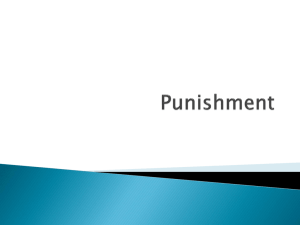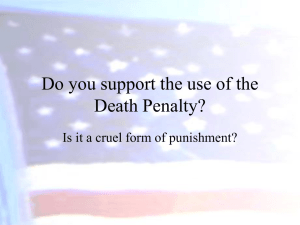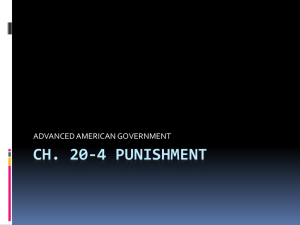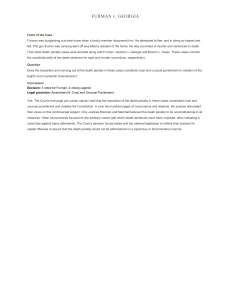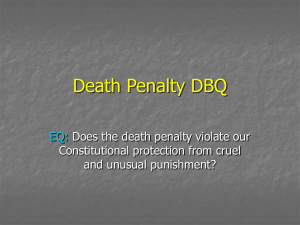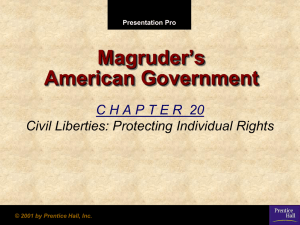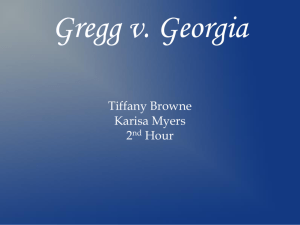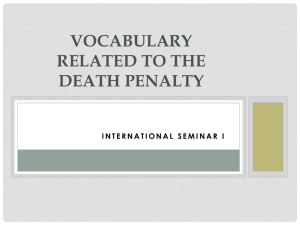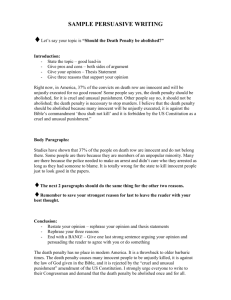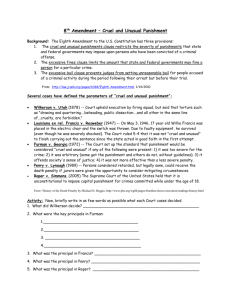punishment - crombiehomepage
advertisement
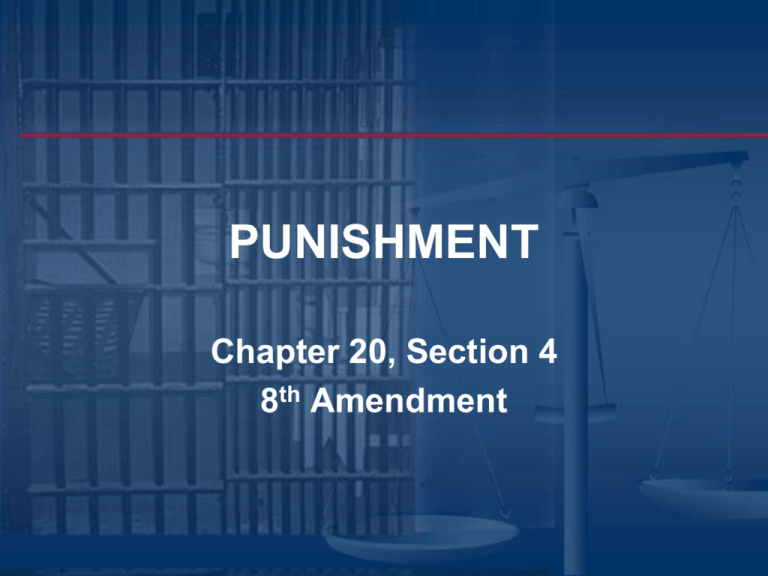
PUNISHMENT Chapter 20, Section 4 8th Amendment 8th Amendment Excessive bail shall not be required, nor excessive fines imposed, nor cruel and unusual punishments inflicted. Bail Bail is a sum of money that the accused may be required to deposit with the court as a guarantee that he or she will appear in court. The Constitution does not guarantee that all accused persons are entitled to bail, just that the amount of the bail cannot be excessive Preventative Detention Preventive detention is a law that allows federal judges to order that accused felons be held without bail if there is a danger that the person will commit another crime if released. Critics think preventive detention amounts to presuming the accused guilty. The Court upheld the law in United States v. Salerno, 1987. Treason is the only crime defined in the Constitution. Treason is: 1. Levying war against the United States or 2. Giving aid and comfort to the enemies of the United States. A person can only commit treason in times of war, and it is punishable by the death penalty. Other related acts, such as sabotage or espionage, can be committed in peacetime. John Brown, who was hanged as a traitor to Virginia because of his raid on Harper’s Ferry, is the only person ever to be executed for treason against a State. Cruel and Unusual Punishment The 8th Amendment also forbids “cruel and unusual punishment.” The Supreme Court extended the provision to the States in Robinson v. California, 1962. The 8th Amendment is intended to prevent, in the Court’s opinion, barbaric tortures such as drawing and quartering and other excessively cruel punishments. The Supreme Court held that defining narcotics addiction as a crime, rather than an illness, was cruel and unusual in Robinson v. California, 1962. In Estelle v. Gamble, 1976, it ruled that a prison inmate could not be denied medical care. However, generally the Court has not found many punishments to be cruel and unusual. Capital Punishment The Supreme Court voided capital punishment laws in the early 1970s because the punishment was applied “capriciously” to only a few convicts, often African American or poor or both. However, in 1976, the Court held for the first time that a new law which instituted the death penalty was NOT unconstitutional. The new law provided for a two-stage trial process. One trial would determine guilt or innocence, and a second hearing would decide whether the death penalty was warranted (Aggravating v Mitigating). The Court later restricted the use of the death penalty to cases where the victim died. Capital Punishment in PA • • • • Hanging – public until 1834, then private 1913 – Electric Chair 1990 – Lethal Injection 231 prisoners on Death Row in PA: 141 black, 70 white, 18 Latino, 2 Asian, 5 women • PA has executed 3 people since 1976 • PA exonerated (found innocent) 6 death row inmates THE THREE DRUG COCKTAIL Sodium thiopental, to cause unconsciousness. Pancuronium bromide, to cause paralysis of all muscles, including the diaphragm, which controls breathing. If not unconscious when this drug is administered, he will experience the physical and psychological agony of suffocation. The use of pancuronium is illegal in 42 states for use in animal euthanasia. Potassium chloride, which is intended to bring about death by causing cardiac arrest. There is no medical dispute that, if an individual is not unconscious, the intravenous injection of this drug causes excruciating pain, likened to setting one’s veins on fire. COSTS • The average cost of a trial in a federal death case is $620,932, about 8 times that of a federal murder case in which the death penalty is not sought. • Providing effective assistance of counsel to indigent defendants is a problem • a correlation exists between the socioeconomic factors of the defendant and death sentences Other Fun Facts • 15 States have no death penalty • Juveniles and Mentally challenged cannot be subject to death penalty in US • Japan and South Korea have DP; most other democracies do not • http://www.amnestyusa.org/deathpenalty/death-penalty-instates/page.do?id=1101153
